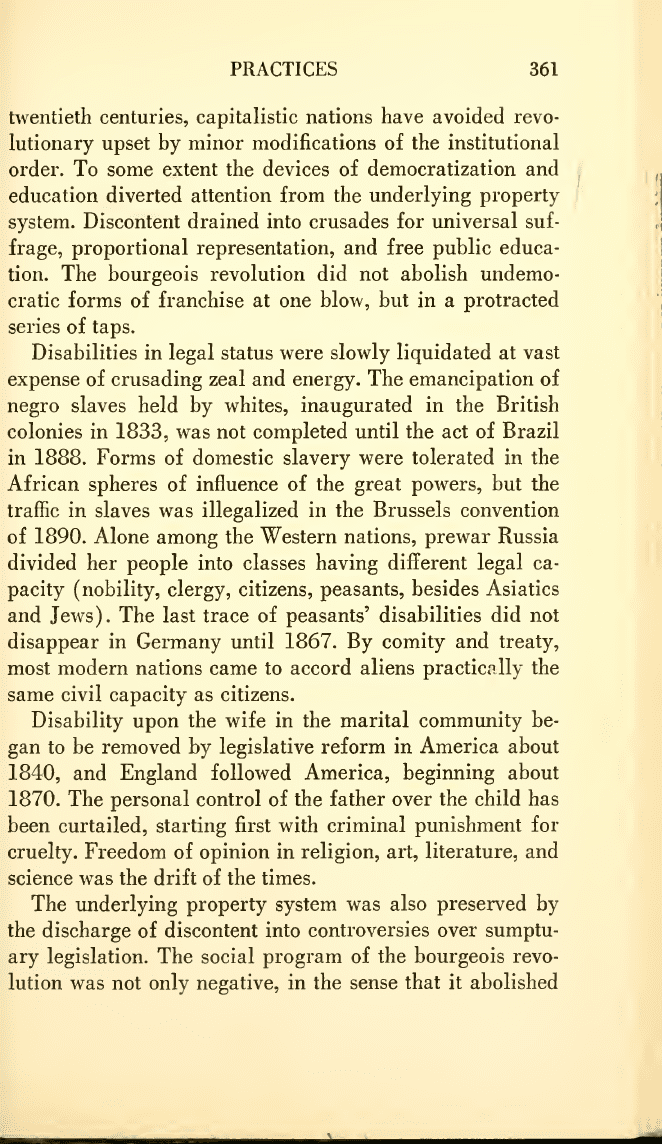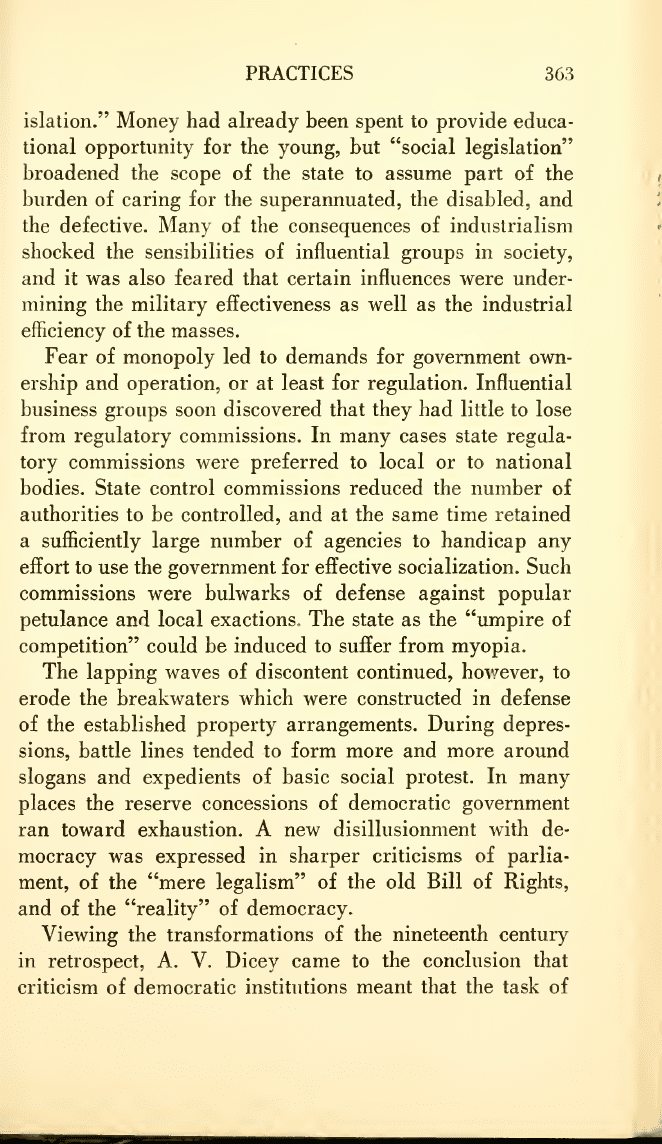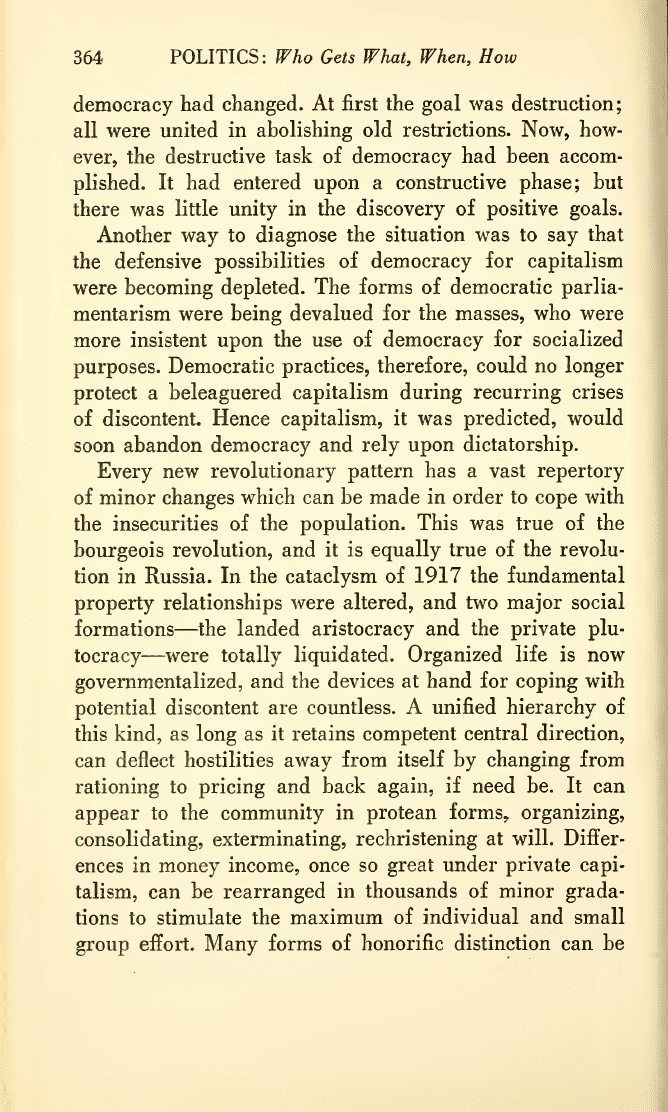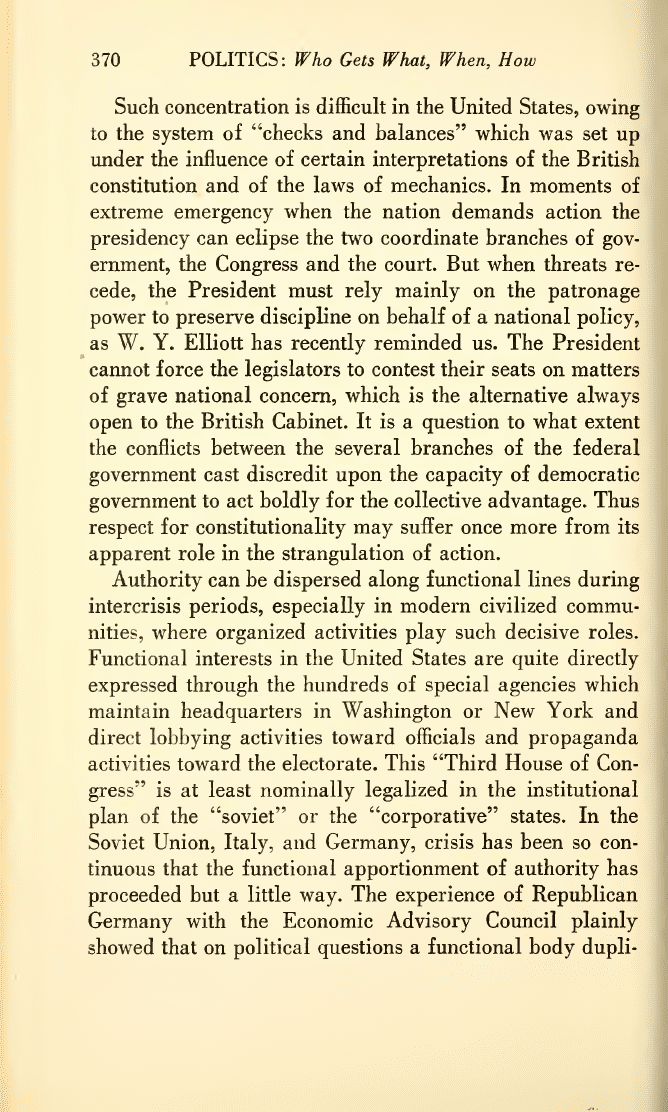Lasswell Harold D. The Political Writings of Harold D. Lasswell
Подождите немного. Документ загружается.


PRACTICES
361
twentieth centuries,
capitalistic nations have avoided revo-
lutionary upset by
minor modifications of the
institutional
order. To
some extent the devices of
democratization and
education
diverted attention from the
underlying property
system. Discontent drained into crusades
for universal suf-
frage, proportional
representation, and free public educa-
tion. The
bourgeois revolution did not abolish undemo-
cratic
forms of
franchise
at
one blow, but in a
protracted
series
of taps.
Disabilities
in legal status
were slowly
liquidated
at
vast
expense
of crusading
zeal and energy. The emancipation of
negro slaves
held by
whites, inaugurated in the
British
colonies
in
1833,
was
not
completed
until
the act of
Brazil
in
1888. Forms
of
domestic slavery were
tolerated
in the
African
spheres of
influence of the great
powers,
but the
traffic in slaves
was
illegalized in the
Brussels convention
of 1890. Alone
among the
Western nations,
prewar
Russia
divided her
people into
classes having
different legal
ca-
pacity (nobility, clergy, citizens, peasants,
besides Asiatics
and
Jews).
The last trace of peasants'
disabilities did
not
disappear in
Germany
until 1867. By
comity
and
treaty,
most modern nations came
to
accord aliens
practically the
same civil capacity
as
citizens.
Disability upon the wife in the
marital community be-
gan to
be
removed by legislative reform
in America about
1840,
and England followed
America, beginning about
1870. The personal control of the
father over the
child
has
been curtailed, starting
first with criminal
punishment for
cruelty. Freedom of
opinion
in
religion, art,
literature, and
science was the
drift
of the
times.
The underlying property system was
also preserved
by
the discharge
of
discontent into
controversies over sumptu-
ary
legislation. The social
program of
the bourgeois
revo-
lution
was not
only negative, in the
sense that
it
abolished

362
POLITICS:
Who
Gets
What, When,
How
restrictions on
the market, but positive,
in
the
sense that it
turned attention to the
possibility
of
molding
a bourgeois
style of life by
means of legislative prohibitions. The
mass
of the
people,
struggling for material
prosperity, cultivated
the
"middle-class" virtues of industriousness and
domestic
regularity, and with the rise of democracy, legislative pol-
icy became more
aggressive toward such disturbing
influ-
ences as
gambling, drink, and vice.
Since the illegalization of
gambling, drinking,
and pros-
titution did not
destroy the demand, the chief eifect
of pro-
hibitory legislation
was to withdraw legal protection from
certain business enterprises. These were compelled to pro-
vide
their own means of
protecting their
investment and
enforcing contracts; hence they paid
for
gangsters and
po-
litical
favors. In the
United States, where administration
is
decentralized, and
there has been little direct control
by
the nation
of
urban and
local
life, the resulting administra-
tive laxity frequently generates "reform waves."
Another safety valve for the discharge of discontents
against something other than the property
system was re-
ligious
revivalism.
English
revivalism began with the Wes-
leys
in 1743. The experiences of mass emotion and the
practice of
assembling, and to some
extent
of acting, to-
gether were of some importance
in shaping
the
labor
move-
ment. But attention was
diverted
from
secular symbols
of
reform
and
revolution. Waves
of
revivalism swept over
Germany from
1814 to
1836,
appealing to the new urban
proletariat and
galvanizing them into
a
semblance of col-
lective action. In such
years of depression
as 1837 and
1853 the United States
was the scene of many
intense
evangelistic
campaigns in the cities where the suffering
was greatest.
When the criticism of
capitalistic individualism
became
practical
politics, concessions
took the form of "social leg-

PRACTICES
363
islation." Money had already been spent to provide
educa-
tional opportunity
for the young, but "social legislation"
broadened the scope
of
the
state to assume part
of the
burden of caring for the superannuated, the disabled,
and
the defective. Many of the consequences of industrialism
shocked
the
sensibilities
of influential groups in society,
and it was also feared that certain influences were under-
mining
the
military
effectiveness as well
as the
industrial
efficiency
of the masses.
Fear
of monopoly led to demands
for
government own-
ership and operation, or at least for regulation. Influential
business groups soon discovered that they had
little to lose
from regulatory commissions. In many cases state regula-
tory commissions
were
preferred to local or to national
bodies.
State
control commissions reduced the number
of
authorities
to be
controlled, and
at
the same time retained
a suflBciently large number of agencies to handicap any
effort
to use the
government for effective socialization. Such
commissions
were
bulwarks
of
defense against popular
petulance and local
exactions. The state
as
the "umpire of
competition"
could be
induced to suffer from myopia.
The lapping waves of discontent continued, however, to
erode
the
breakwaters which were constructed in defense
of the established property
arrangements. During depres-
sions, battle lines tended to form more
and more around
slogans
and
expedients of
basic
social
protest. In
many
places the reserve concessions of
democratic government
ran toward exhaustion. A
new disillusionment with de-
mocracy
was expressed
in
sharper criticisms of parlia-
ment,
of the "mere
legalism" of
the old Bill of Rights,
and of the "reality" of democracy.
Viewing
the
transformations of the
nineteenth
century
in
retrospect, A.
V.
Dicey came to
the conclusion that
criticism
of democratic
institutions
meant that the task of

364
POLITICS:
Who Gets What,
When,
How
democracy
had
changed.
At first the
goal was
destruction;
all
were
united in
abolishing old restrictions. Now, how-
ever, the
destructive task of democracy had been
accom-
plished. It had
entered upon a
constructive phase; but
there was
little unity in the
discovery of positive goals.
Another way
to diagnose
the situation was to say
that
the
defensive
possibilities of democracy for
capitalism
were
becoming
depleted. The
forms
of
democratic parlia-
mentarism were
being devalued
for the masses, who were
more insistent
upon the use of
democracy for
socialized
purposes.
Democratic
practices, therefore, could no
longer
protect a
beleaguered
capitalism during
recurring crises
of
discontent.
Hence capitalism, it was
predicted, would
soon
abandon
democracy and
rely upon dictatorship.
Every new
revolutionary
pattern has a vast repertory
of minor changes
which can be
made in order to cope with
the
insecurities
of
the
population. This was true of the
bourgeois
revolution, and it
is equally true of the revolu-
tion in Russia.
In the cataclysm of
1917 the fundamental
property
relationships were altered,
and two major social
formations
—the landed
aristocracy and the private plu-
tocracy—
were totally
liquidated. Organized
life
is
now
govemmentalized, and the
devices at hand for
coping
with
potential discontent
are countless. A unified
hierarchy
of
this
kind, as long as
it retains competent
central direction,
can
deflect
hostilities away from itself
by changing from
rationing to pricing and
back
again, if need be. It
can
appear to the
community in
protean forms, organizing,
consolidating,
exterminating,
rechristening at will.
Differ-
ences
in
money income, once so
great under
private
capi-
talism, can be
rearranged
in thousands of
minor grada-
tions to
stimulate the
maximum of
individual and
small
group effort. Many
forms of
honorific distinction can be

PRACTICES
365
invented,
and discarded
when stigma becomes attached
to
them.
Plainly
it
is not
profitable to consider any practice
apart
from the
principal features
of
the context in which it
oper-
ates.
Elite preservation is furthered by
judicious
combina-
tions of
efficiency and acceptability. It
is
dangerous to
sacrifice
acceptability for efficiency; and it is dangerous
to allow
momentary considerations of acceptability
to ob-
scure
the long-run dangers of
some forms
of
inefficiency.
Judgments
about all the
traditional patterns
of policy
making and administration
require constant revision
in
the
light
of
the purposes to be
served in changing
circum-
stances. The perils of overemphasis are
only
matched by
the perils of
underemphasis,
whether
the pattern in ques-
tion is
dictatorship or democracy, centralization or decen-
tralization,
concentration or dispersion, functional uni-
versalization
or
limitation, obedience or originality, bias
or objectivity.
Crisis demands
dictatorship, centralization,
concentra-
tion, obedience, and bias.
Intercrisis permits
concessions
toward democracy,
decentralization, dispersion,
original-
ity, and
objectivity.
Once
reasonably certain
of
rather general
support,
a
recently
established elite
can
afford
to
democratize
the
basis of authority, and to use
liberalities and
restrictions
as chips in the baccarat of
catharsis
and readjustment.
Members of any successful revolutionary party want their
friends to join for the
sake
of
security
and influence within
the
party, and there are
members
of
the community
who
seek the privileges
that
come
from belonging
to the
new
"aristocracy." Hence the party is diluted
by members
who
are
insufficiently indoctrinated. These members
are
disposed
to
exercise their influence on behalf of
concilia-

366
POLITICS: Who
Gets What, When, How
tory
and
temporizing policies. This alarms
the "diehard"
fundamentalists
of
a
vigorous
revolutionary party, and
sharpens
the contradiction between "orthodox"
and "mod-
erates." The men on
top
of the party pyramid
can
take
advantage
of this contradiction to
hold
first
one and then
another party element responsible for
any recent failures.
Hence the
celebrated "purges"
which expunge "wavering"
or
"irreconcilable" personalities
from the party rolls.
Then
the process of accretion begins again.
Roberto
Michels has called the expansion and contraction
of
revo-
lutionary
parties
the "accordion rh5^hm." As
a
general
sense
of security increases, the trend
is toward democrati-
zation.
Although it is necessary to centralize in crises,
when
prompt, decisive action is safer than malcoordination
and
delay, centralization has notorious disadvantages. In or-
der to mitigate
the
bureaucratic
consequences of great
centralization,
authorities in the
Soviet Union
have en-
couraged many
devices
of mass criticism. Wall
newspa-
pers
are
prepared in plants and clubs, and the peasants'
correspondence ventilates many grievances and fosters
initiative. Plainly, however, mass
criticism
can be encour-
aged only
when the elite is
sufficiently
secure.
Modern
devices
of
"attitude measurement"
have been
applied to
the task of keeping the
elite informed
of the
changing waves
of
discontent. Data are carefully tabulated
in
"morale charts"
to
show the spores of
disaffection
and
noncooperation.
The
invention of
certain technical devices has
made
it
possible to compare
the
results of administrative effort,
and
to
stimulate honesty and
emulation. Sidney and Beatrice
Webb
have remarked
that in the early
part
of the nine-
teenth
century the business of
government in Great
Britain,
whether
national
or local
government, was honeycombed

PRACTICES
367
with
"favouritism,
corruption, and barefaced
peculation."
Most of
this was
swept away by the
adoption of the audit,
a
device
which
is
scarcely a century old.
The practice
of
checking
the cash transactions of all
public
officials by
a
special
class of independent
experts has improved
the gen-
eral standard of honesty no less
than accuracy,
and proved
how the "habits of
human nature" can be
altered on
a
large scale.
As crisis recedes,
governments can
decentralize. It is im-
portant, however, to manage
the
decentralization in such a
way that central agencies
can resume
control in lawful
ways when
future emergencies
arise. This is the great tech-
nical
advantage
of
the practice of
devolution, which invests
a
subordinate authority with a broad
competence, subject
to specific reservations and future
resumptions. Some
of
the "home
rule charters" in
American urban communities
exhibit
true
devolutions
of
authority. But the
scope of
this
principle in the nation as a whole is
circumscribed by the
federal practice, which delegates
specific and limited au-
thority to
a
central agency. A
necessary concession to
ac-
ceptability when the federal
constitution was
drafted,
it has
often barred the path
to efficiency. It is
inimical
to respect
for
constitutionality when formal barriers are too
high
for
prompt
centralization in crises.
Intimately connected with the
expedient degree
of cen-
tralization is the problem of
organizing public authority
in
legislatures or in
assemblies. In nations like the United
States, where there has been some
degree of exemption
from the fear of foreign
attack, legislatures have
been
channels of regional
trading rather than
national
policy.
It
is
abundantly
plain,
of
course, that any national policy
implies the consideration of component
interests
and senti-
ments. But legislatures
create vested and sentimental inter-
ests
which
weight
national policy in the direction of patch-

368
POLITICS: Who Gets What, When, How
work
rather than mosaic. The
local legislator often
devotes
himself to the advancement of neighborhood
projects
by
striking bargains on national
issues.
Such
consequences need
not
invariably
be associated
with legislatures. In Great Britain, for example,
a singu-
larly delicate set of understandings has been
developed
which
render it possible
to
change
the effective executive
(the Cabinet) only after
a
general election.
Special proce-
dures have been invented to route local matters
through
channels which integrate them in terms of national
policy.
For modem governments, however, it is probably expe-
dient to
minimize
the effect of interlocality trading
by
sharing authority with
assemblies and not with legisla-
tures.
Thus the Soviet Union
operates with an assembly
rather
than
a
legislature.
The
assembly
is composed of
a
great many
delegates, meets for a short
time,
listens to
broad
reports
and discussions of policy, expresses itself,
especially by the choice of a continuing committee, and
retires. This assembly is an
important
instrument for
procuring acceptance of the policies of the central execu-
tive. But it need not be assumed that the tone of the assem-
bly is without
influence
upon the men at the center.
No
doubt
there
will be many
efforts
to extend the influ-
ence
of the assembly
and
to
transform it into
an agency
exercising the same detailed supervision over
policy and
administration in the Soviet Union which legislatures
have
obtained in many foreign lands. But it is doubtful if the
authority of the assembly will increase
appreciably
in the
visible future of the Soviet Union, because
the
specter of
external
danger is not laid,
and
in
centralization lies
pre-
paredness.
There
are many ways
short of formal
centralization
by
why^h united action may be attained.
The "grant-in-aid"

PRACTICES
369
offers
tangible
inducement to local authorities
to conform
to
centrally
defined
standards.
The
device
of
the
executive
budget
compels
the consideration
of the total communal
enterprise.
Both
the talk
and the
practice
of planning
focus
attention
upon
definite
goals,
and
compel the justification
of local
demands in
terms
of inclusive advantages.
Crises not
only
make
it
wise
to centralize but to
concen-
trate
authority. In the acute
struggles
from 1917 through
1921
in
Russia, influence
became
more concentrated
in the
Communist party at
the expense
of
rival
agencies.
Rival
parties were at first allowed to
persist,
but they were
pres-
ently
liquidated as
the Communist party
established
a
mo-
nopoly of legality. Other
influential
organizations,
like
the
army, the trades unions,
and
the cooperatives
were all
sub-
ordinated to the party. That decisive, though
piecemeal,
liquidation of organized nodules of actual
or potential
op-
position is essential to dictatorship was
thoroughly
learned
by
Mussolini and Hitler from the
Russian experience.
Hit-
ler moved with
the
utmost dispatch.
On May
2,
1933, the
old
trades-union
officials
of Germany were
ejected from
their
posts,
their buildings
and property seized,
their
mem-
bers incorporated
in a special organization
of the
National
Socialist party.
Within a few more
days all the
political
parties were
destroyed. Meanwhile hostile
elements
were
"purified" from
the government services,
and the
"totali-
tarian" state
was close to completion.
As
crisis recedes in the
Soviet Union,
the political
com-
mittee
of the Communist
party is able, in
actual practice,
to
share more
authority
with roughly
coordinate
agencies.
Initiative
can be permitted
in more centers and
funneled
less
narrowly
through the principal party
conduit.
But the
committee
will
doubtless continue to integrate
the life
of the
entire
Union
whenever a sense of threat,
or
a
chance
of
expansion,
inspires
the ruling
elite.

370
POLITICS: Who
Gets What,
When,
How
Such concentration is difficult in the
United States,
owing
to the system of
"checks
and balances" which
was set
up
under the
influence of certain
interpretations
of
the
British
constitution and of the laws of mechanics.
In moments
of
extreme emergency when the nation
demands action the
presidency can eclipse the two coordinate branches
of gov-
ernment, the Congress and
the
court. But when threats
re-
cede, the President must rely
mainly
on the patronage
power to preserve discipline on behalf of a national policy,
as W. Y.
Elliott
has recently
reminded
us. The President
cannot force the
legislators
to
contest their
seats on matters
of grave national concern,
which is
the alternative always
open to the
British
Cabinet.
It is
a
question
to what
extent
the
conflicts
between
the
several
branches
of the federal
government cast
discredit
upon
the capacity
of
democratic
government to act
boldly for
the
collective advantage. Thus
respect for
constitutionality may suffer once more from
its
apparent role in the
strangulation
of
action.
Authority
can be
dispersed along functional lines during
intercrisis periods,
especially
in
modern civilized commu-
nities,
where
organized activities play such decisive roles.
Functional interests
in the United States are quite directly
expressed through the
hundreds of special agencies which
maintain headquarters
in Washington or New York and
direct
lobbying activities toward officials and propaganda
activities toward the electorate. This "Third House of Con-
gress" is at least
nominally
legalized in
the
institutional
plan of the
"soviet" or the
"corporative"
states. In the
Soviet
Union, Italy, and Germany,
crisis
has
been
so con-
tinuous that the functional
apportionment
of
authority
has
proceeded but
a
little
way. The experience
of
Republican
Germany with the
Economic Advisory Council plainly
showed
that on
political questions a
functional body dupli-
